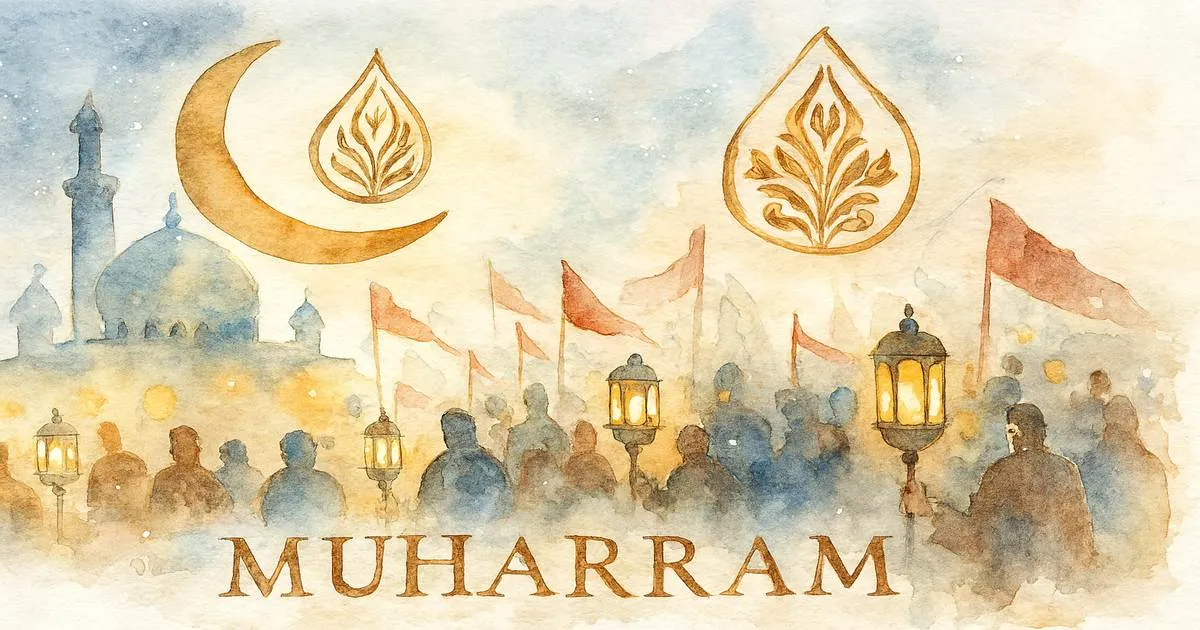Muharram is one of the biggest observances of Islam, it is the beginning of the Islamic New Year. According to the Islamic calendar and placement of moon, Muharram is observed in its first month. There are four sacred months of Islam, and this is observed in one of them. Muharram is a time which is like paying a tribute to faith, sacrifices and peace.
This day is observed by Muslims across the globe, and they do not just observe it as start of their new year , but this day has deeper spiritual connections, worship, bereavement and soul-searching. The date of Muharram each year is determined by the sighting of the moon.
Meaning and Importance of Muharram
The origin of the word Muharram is Arabic and it means “forbidden” or “sacred”. During the month when Muharram is observed, Muslims are prohibited from indulging in any kind of violence, battle or war. During this month, Muslims indulge mainly in self-restraint, determination and spiritual refinement. This is also the time for them to focus on core human values of devotion, renunciation and integrity.
Both the Shia Muslims and Sunni Muslims observe Muharram. Sunni Muslims do fast and introspection on this day. Shia Muslims recognize this day as a period of tribute and bereavement. Shia Muslims honour the self-sacrifice of Imam Hussain (RA) who was the much-loved grandson of Prophet Muhammad (PBUH)
The Tragic Battle of Karbala
On the tenth day from Muharram, Muslims observe Ashura, which is the most notable day of that sacred month. This day is about remembrance of the Battle of Karbala, which happened in the desert plains of Karbala, Iraq.
Imam Hussain was the grandson of Prophet Muhammad who raised his voice against the immoral ruler Yazid ibn Muawiya. It was almost certain that if Imam Hussain and his friends raised voice against this unjust leader, they will face death but still they chose to fight for justice.
They were executed to death on the 10th of Muharram. The tragedy of Karbala was not just an event recorded in the history books, but also an example of war of truth against injustice and of how to stand against wrong even in times of adversity.
Traditions During Muharram
1. Fasting on Ashura
Sunni Muslims fast on Ashura which is the 10th day of Muharram to honour the liberation of Prophet Musa (Moses) and the Israelites from the oppression of Pharaoh. They fast to pay their respects and as a symbol of cleansing and devotion.
2. Mourning and Majlis (Gatherings)
Shia Muslims deeply mourn on this day. Majlis are held, which are special gatherings again and again announcing the story of Imam Hussain’s sacrifice. Majlis reinforces the power of fight for justice.
They wear black outfits to express grief. Matam is performed which is mourning ritual to show immense grief.
3. Charity and Compassion Muharram also teaches the followers to indulge in helping others and in good and charitable acts.
Many feed and share food the needy and poor as the true meaning and feeling behind this day is virtue, gratitude and ode to humanity- all the emotions that Imam Hussain had.
Global Observance of Muharram
All the Muslims observe this day with great unpretentiousness:
- Majlis which are special gatherings are common on this day in countries like India, Pakistan, and Bangladesh..
- One of the largest gatherings happens near the shrine of Imam Hussain in Karbala on the day of Ashura, which is the tentg day of Muharram.
- Black banners and other symbols of grief are presented in Iraq from Muharram to Ashura.
- In countries like Egypt, Indonesia, and Turkey, the ritual followed on this day is fasting and prayer. This signifies the true representation of the day’s origin.
Conclusion
The legend of Karbala surpasses ages and communities. It is a true representation of war of virtue against injustice and the selfless sacrifices that entails it. It shoes that even though the timeless warrior sacrificed themselves they will live in the minds, hearts and souls of all ages to come.
Muharram is also the start of the Islamic new calendar which signifies new beginnings through tough times and with a clean heart. Even though the ways and means to observe the day of Muharram and Ashura are different in different regions and countries, the core spirit everywhere is the same. The core values on this day which resonate everywhere are faith, virtue, compassion and peace.
The bequest of Imam Hussain still lingers in the Muslims around the world and continues to inspire them and believe and stand for justice and virtue.
